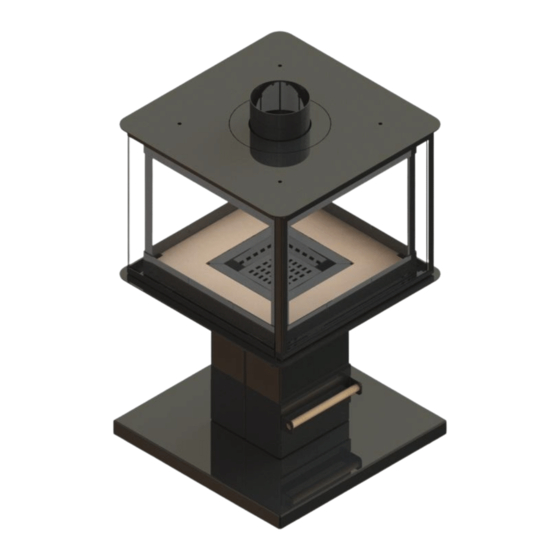A.caminetti 4D Manual Of Use And Installation - Page 7
Browse online or download pdf Manual Of Use And Installation for Outdoor Fireplace A.caminetti 4D. A.caminetti 4D 11 pages.

OUTDOOR FIREPLACE
MATERIAL NEEDED -A few larger wooden billets (split; max. humidity 20%; approx. 10-13 cm)- a handfulof
splints for kindling (dia. approx. 2-5 cm ; max. humidity 20%,) -Tinder of choice -Matches/Lighter.
Lighting
1. Open Door
2. Stack logs as shown use logs that are no more than 350mm Long.
3. Place kindling on top as shown.
4. Use a tapper or long match to light kindling.
5. Close door once kindling is lit.
6. It will help with lighting if the ash box is opened slightly.
7. Close ash box immediately logs start to burn.
Extinguishing
1. Allow fire to burn itself out.
2. Do NOT use water to extinguish as this is dangerous and may cause glass to shatter causing serious injury
or damage to property and damage to the outdoor firelace.
This outdoor fireplace is designed to burn wood with a humidity of up to 20%. Using coal, coke,
coal-ba-sed products, plastic, litter, cloths and otherflammable materials is not allowed. Burning
approved wood briquettes made of wood dust or pellet istemporarily allowed, but in small quantities only.
The following is practical guidance for assessing thewood used as fuel. The wood which is to have a
humidity of 18-20% must be seasoned for 18-24 monthsor kiln-dried. As the humidity of wood
de-creases, its net calorific value rises, which brings financialsavings of even up to 30% of the total wood
weight needed to run the appliance during one heatingseason. If the wood used for burning is of too high
humidity, then, too much energy needed forevaporation and condensation in the flue pipe or combustion
chamber can be consumed, which affectsthe heating process of a room. Another negative process
occurring when the high-humidity wood is
used is the emission of creosote, a deposit which damages the chimney flue and, in extreme cases, can
result in ignition and a chimney fire. It is therefore recommended to use hardwood like oak, beech,
hornbeam or birch. Lower calorific va- lues are typical of the coniferous trees and burning their wood
produces heavy soot accumulation on the glass.
